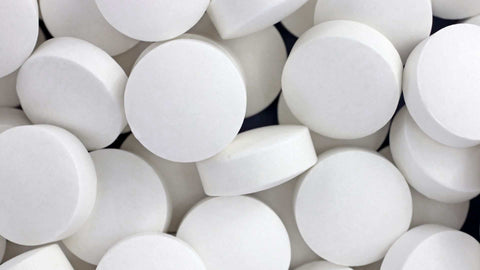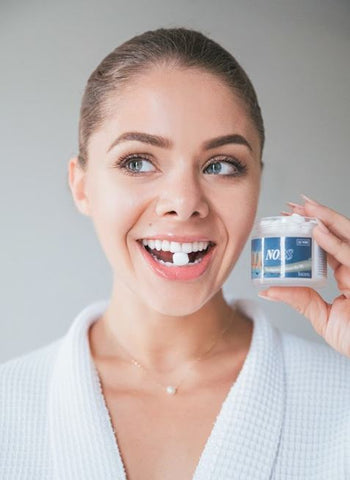Is Nano Hydroxyapatite Safe?
Yes, nano hydroxyapatite is safe. While nano particles have previously been scrutinized for safety, evidence suggests that they are safe at up to 10% nano hydroxyapatite concentration in toothpaste.
Not to mention, the inclusion of nano hydroxyapatite particles in toothpaste may offer a better alternative to fluoride, which has been associated with toxicity concerns in some cases.
Nano hydroxyapatite toothpaste has a number of oral care benefits, including:
-
Remineralizing capabilities
-
Strengthening tooth enamel
-
Preventing tooth decay
-
Reducing tooth sensitivity
-
Fighting dry mouth
This article will explain everything you need to know about hydroxyapatite nanoparticles, safety, and benefits.
WHAT IS NANO HYDROXYAPATITE?

Nano hydroxyapatite is a derivative of a naturally occurring organic material called calcium phosphate.
Thanks to its function as a biocompatible mineral, nHA has many uses in medicine, including the ability to stimulate bone growth.
One of the most popular uses comes from regenerative dentistry, in the form of remineralizing toothpaste with nano hydroxyapatite.
When used in toothpaste, nano hydroxyapatite is known for its ability to remineralize teeth and strengthen the tooth surface.
WHERE DOES NANO HYDROXYAPATITE COME FROM?

Nano-hydroxyapatite is a derivative of calcium phosphate that is naturally found in your teeth and bones.
While it has many medical applications, some dental professionals promote nano medical hydroxyapatite as an alternative to fluoride in toothpaste.
In fact, it is an effective studied biomaterial that has shown potential for remineralization and repairing teeth without any undesirable systemic effects.
HOW DOES NANO HYDROXYAPATITE WORK?

Because it is made from the same materials your teeth are made of, nano hydroxyapatite toothpaste works by fighting tooth decay, filling in your enamel with calcium and phosphate to restore and strengthen your teeth.
A standard diet with acid and sugar will slowly eat away at your enamel. Without intervention, your enamel erodes and cavities form.
Dental professionals use nano hydroxyapatite paste to prevent this erosion and to improve your oral health overall.
Why do people say nano hydroxyapatite isn't safe?

The argument that nano hydroxyapatite isn't safe largely comes from the fear surrounding nano particles. Because nano particles are small, some individuals worry about their potential to penetrate skin or mucous membranes.
However, these concerns only apply to needle-shaped nano hydroxyapatite which is banned by the Scientific Committee on Consumer Safety and cannot legally be used in oral products.
Additionally, the SCCS deems nano hydroxyapatite safe in toothpaste (up to 10%) and mouthwash (up to 0.465%) when composed of rod-shaped particles and free of coatings.
Further, concerns about the safety of nano hydroxyapatite arise from concerns about quality control and changing guidelines from different regulatory bodies.
That's why, here at biöm, we're proud to manufacture our dental products with 5% rod-shaped nano hydroxyapatite in FDA-compliant facilities. In fact, that's what the "NOBS" in our NOBS Toothpaste Tablets stands for - no bad stuff. Get it?
Is nano hydroxyapatite safe for kids?

Yes, nano hydroxyapatite is safe for kids. In fact, nano hydroxyapatite is considered by many dentists as a better alternative to fluoride for children for a number of developmental and physical reasons.
For example, some researchers suggest hydroxyapatite is a promising solution early childhood caries. Further, a meta analysis concluded that, "biomimetic hydroxyapatite-containing, fluoride-free oral care products are effective in reducing dental decay, especially in children."
Finally, another study using the International Caries Detection and Assessment System concluded, at the end of a year-long trial, that hydroxyapatite toothpaste was not inferior to a fluoride control toothpaste.
Is hydroxyapatite safe to swallow?
Yes, hydroxyapatite is safe to swallow!
Research states that it is a naturally occurring mineral in our bones and teeth, making it non-toxic and biocompatible.
Since it’s similar to the material already found in your body, it doesn’t cause harm when ingested.
In fact, studies have shown that nano hydroxyapatite toothpaste is safe for daily use, even if swallowed in small amounts.
It is commonly used in oral care products because it supports enamel health without harmful side effects.
Recent studies also suggest that hydroxyapatite is safe for both children and adults, making it a gentle option for family-friendly oral care.
So, there’s no need to worry if a little is accidentally swallowed.
Risks of Fluoride Toothpaste for Children
Nano hydroxyapatite toothpaste for kids is ideal, not only because it strengthens their teeth, but also because it keeps them away from fluoride toothpaste which can have negative side effects.
Ingestion
While you should never be intentionally swallowing your toothpaste, nano hydroxyapatite is safer to ingest for children than fluoride, especially for those living in an area with a high concentration of fluoride in the water supply.
In fact, one study even found that, "Greater exposure to high levels of fluoride in water was significantly associated with reduced levels of intelligence in children."
For this reason, switching to kids hydroxyapatite toothpaste is a good choice to make for your child's safety.
Teeth Discoloration
Excess exposure to fluoride during your child's development can lead to an unsightly condition called dental fluorosis.
When children are exposed to fluoride during tooth development, their dental enamel is disturbed. This leads to lower mineral content and increased porosity throughout their life.
To protect your children, consider switching to a fluoride free toothpaste, like a hydroxyapatite toothpaste, while they're still young.
Brain Development
Similar to tooth development, fluoride also negatively impacts pediatric brain development.
In particular, one study found that "Exposure to increasing levels of fluoride in tap water was associated with diminished non-verbal intellectual abilities".
Nano hydroxyapatite toothpastes, on the other hand, have not been shown to exhibit toxic activity.
BENEFITS OF NANO HYDROXYAPATITE

Hydroxyapatite nanoparticles are a natural complement to your tooth enamel as they are both made of the same materials.
Thus, nano hydroxyapatite has a number of oral health benefits and makes a great fluoride alternative.
Completely Non Toxic
Hydroxyapatite is biocompatible with the human body. It is naturally occurring organic material found in your teeth and bones. Thus, it is safely used in oral care without harmful side effects.
Fights Teeth Sensitivity
Nano hydroxyapatite is an effective desensitizing agent. Studies show that it is a safe material for reducing dentin hypersensitivity.
By depositing minerals into the protective layer of your teeth, hydroxyapatite toothpaste can reduce tooth sensitivity and make a significant difference in your ability to tolerate temperature, acidity, and sugar.
Fights Tooth Decay and Cavities
Hydroxyapatite works by depositing natural minerals back into your teeth through a process called enamel remineralization.
Remineralization is essential for a healthy mouth and protects against tooth loss. This process stimulates bone growth and reduces incidence of cavities.
Makes Teeth Strong
Nano hydroxyapatite functions to strength your enamel surface and increase the mineral density of your teeth. This process makes your teeth stronger and glossier while also decreasing your chances of tooth decay, leading to a beautiful smile!
NANO HYDROXYAPATITE VS. FLUORIDE TOOTHPASTE

While fluoride is the historical gold standard in cavity prevention, studies suggest that nano hydroxyapatite is equally as effective as fluoride, if not more, at remineralization.
Interestingly, one study even found that nano hydroxyapatite was more effective than a comparable fluoride varnish.
In this section, we'll explore the differences between the two ingredients.
MECHANISM
While fluoride toothpastes work by depositing fluoride ions into your enamel, fluoride free toothpaste with hydroxyapatite works by depositing naturally beneficial materials like calcium and phosphate ions into your enamel.
Since your enamel is already made of calcium and phosphate, among other materials, synthetic hydroxyapatite reinforces the existing tooth structure.
EFFICACY
Both fluoride and nano hydroxyapatite toothpaste are effective at supporting good oral health through:
-
reducing teeth sensitivity
-
promoting dentine remineralization
-
preventing tooth decay
-
supporting the oral microbiome
-
and increased enamel surface hardness.
Further, studies show both compounds have similar comparative efficacy for remineralizing teeth, lesion depth reduction, and inhibiting enamel caries progression.
SAFETY
Since nano hydroxyapatite is a naturally occurring material that your body already makes, there are no safety or toxicity concerns.
On the other hand, fluoride is a controversial ingredient in dentistry for its role in negatively affecting fetal brain development and causing dental fluorosis.
AFFORDABILITY
Nano hydroxyapatite is a more expensive ingredient than fluoride. Thus, nano hydroxyapatite toothpastes tend to be more expensive than fluoridated toothpastes.
AVAILABILITY
Fluoride toothpastes are more widely available and can be found at any grocery store, drug store, or online. Hydroxyapatite toothpaste brands are less widely available and more likely to be found online than in retail stores.
Is Nano Hydroxyapatite Toothpaste Safer Than Fluoride Toothpaste?
Yes, nano hydroxyapatite toothpaste is safer than conventional fluoride toothpaste.
Research suggests that nano hydroxyapatite toothpaste may have fewer safety concerns compared to fluoride toothpaste, particularly for certain populations such as:
-
Pregnant women
-
People prone to tooth decay and cavities
-
People who live in environments with high fluoride concentrations in the water
So, do yourself a favor and pick up some nano hydroxyapatite toothpaste tablets today.
But does it reverse cavities?
While studies suggest that nano hydroxyapatite can decrease the depth of initial enamel caries, but we do not have enough evidence to conclude that nano hydroxyapatite reverses cavities at this time.
However, research shows that nano hydroxyapatite is excellent at remineralizing teeth. Remineralization is the first step to preventing tooth decay and, ultimately, cavities.
In fact, one study even showed that nano hydroxyapatite was capable of remineralizing teeth better than a fluoride varnish.
Is nano hydroxyapatite good for tooth sensitivity?
Yes, nano hydroxyapatite is good for treating tooth sensitivity.
One study even found that nano hydroxyapatite toothpaste significantly reduces dentin hypersensitivity in less than two weeks. Another study showed that nano hydroxyapatite toothpaste was effective at relieving sensitivity when used twice daily.
Still further, another paper suggests nano hydroxyapatite "can be advocated in the management of hypersensitivity".
IS NANO HYDROXYAPATITE BANNED IN THE EU?
No, nano hydroxyapatite is not banned in the EU.
As of March 2023, the EU Scientific Committee of Consumer Safety determined "hydroxyapatite (nano) safe when used at concentrations up to 10% in toothpaste, and up to 0.465% in mouthwash".
This conclusion came after much research and debate over the safety and potential health risks of nano sized particles in oral cosmetics.
IS NANO HYDROXYAPATITE APPROVED BY THE FDA?
Nano hydroxyapatite is generally regarded as safe by the FDA, but it has not yet been fully approved as a medical device for regenerative dentistry practices.
In layman's terms, nano hydroxyapatite has been studied for its safety as an ingredient, but there are marketing restrictions around it at this time.
Can you swallow nano hydroxyapatite?

Yes, you can swallow nano hydroxyapatite safely. In fact, research suggests that your stomach acid immediately dissolves nano hydroxyapatite particles if you swallow them.
That's why nano hydroxyapatite toothpaste is the best choice for children who haven't quite learned how to brush their teeth properly yet!
Does nano hydroxyapatite toothpaste "feel" different?
No, nano hydroxyapatite toothpaste doesn't feel any different than your traditional fluoride toothpaste.
While our nano hydroxyapatite toothpaste tablets come in a chewable form that dissolves into a foamy paste, our kids hydroxyapatite toothpaste toothpaste feels like your standard tube toothpaste.
No grittiness or unpleasant flavor - just pure safety and efficacy!
The Bottom Line: Is nano hydroxyapatite safe to use?

The answer is straightforward yes, nano hydroxyapatite is safe to use. In fact, research indicates that nano hydroxyapatite toothpaste may have fewer safety concerns compared to fluoride toothpaste.
Nano hydroxyapatite particles do not induce toxicity the way overconsumption of fluoride can. This is particularly important for certain populations such as:
-
pregnant women
-
children
-
people prone to tooth decay and cavities
-
people who live in environments with high fluoride concentrations in the water
Therefore, choosing nano hydroxyapatite toothpaste tablets can be your ideal step toward a safer, travel-friendly and more effective oral care routine.
FREQUENTLY ASKED QUESTIONS
How does nano hydroxyapatite feel on your teeth?
Nano hydroxyapatite leaves your teeth feeling smooth and glossy. It's an effective remineralizing agent that naturally fills the holes in your enamel and prevents cavities.
Is Nano hydroxyapatite FDA approved?
Nano hydroxyapatite is regarded as generally safe by the FDA, but it is not approved as a medical device for the specific treatment of cavities. There is sufficient evidence of nano hydroxyapatite safety and its ability to effectively treat a number of oral health conditions.
Do dentists recommend hydroxyapatite?
Yes, dentists recommend nano hydroxyapatite toothpaste for daily use. Unlike fluoride, nano hydroxyapatite toothpaste has a number of dental benefits with no toxicity concerns.
Where does nano hydroxyapatite come from?
Nano hydroxyapatite is derived from calcium phosphate, a substance naturally present in your teeth and bones. It has various medical applications, and in dentistry, it is used for its remineralizing properties.
How does nano hydroxyapatite work?
Nano HA toothpaste works by depositing minerals back into your teeth. This oral care mechanism supports your tooth enamel and prevents tooth decay through a process called remineralization. It mimics the natural composition of your teeth to help combat the erosion caused by a diet high in acid and sugar, promoting overall oral health.
Is nano hydroxyapatite harmful to your teeth?
No, nano hydroxyapatite is not harmful to your teeth. Numerous studies have investigated the safety of nano-hydroxyapatite, with key findings supporting its safety in dental applications. A study from 2022, which assessed the effectiveness of hydroxyapatite toothpastes like n-Ha against dental caries, reported no adverse effects associated with the chemical.
Can I use nano hydroxyapatite toothpaste everyday?
Yes, you can use nano hydroxyapatite toothpaste every day. It's just as effective as fluoride but safer since it's made from natural minerals. Using it daily makes your teeth stronger, safeguards enamel, and prevents decay, keeping your oral health in great shape.
How long does nano-HA toothpaste help with tooth sensitivity?
Nano-hydroxyapatite (Nano-HA) toothpaste can provide relief from tooth sensitivity within a few days to a couple of weeks of consistent use. The particles help rebuild enamel and block exposed dentin, reducing sensitivity over time. Continued use ensures lasting protection and ongoing relief.
Is hydroxyapatite safe?
Yes, hydroxyapatite is considered safe, particularly in dental products like toothpaste and mouthwash. It is a naturally occurring mineral that helps strengthen enamel and has been evaluated as safe when used at approved concentrations. Nano-hydroxyapatite, specifically, is safe when composed of rod-shaped particles and meets regulatory standards.
Is hydroxyapatite nano safe?
Yes, nano-hydroxyapatite is considered safe for use in oral care products. Research indicates that it is non-toxic, biocompatible, and mimics the natural mineral structure of teeth, making it effective and gentle. Its safety and effectiveness make it suitable for both adults and children.
What are the negatives of hydroxyapatite toothpaste?
Hydroxyapatite toothpaste has no known negatives and is considered safe for daily use. It effectively strengthens enamel, reduces sensitivity, and prevents cavities without harmful side effects. It’s a non-toxic and kid-friendly alternative to fluoride toothpaste.
Can nano hydroxyapatite reverse cavities?
Nano-hydroxyapatite (nHA) can help reverse early-stage cavities by remineralizing damaged enamel. nHA restores lost minerals and strengthens weakened tooth structure, preventing cavities from worsening. However, it is less effective for advanced cavities, which may require professional dental treatment.
Can you leave hydroxyapatite on your teeth?
Yes, you can leave hydroxyapatite on your teeth. It helps strengthen and repair your enamel, so leaving it on can be beneficial. Just make sure to follow the instructions on your toothpaste or oral care product for best results.
What happens if you swallow hydroxyapatite?
Swallowing small amounts of hydroxyapatite is safe since it’s a mineral found naturally in your body. Research shows that it doesn’t harm your health when ingested. If you accidentally swallow it, there’s no need to worry, as it’s non-toxic and gentle.
Should I use nano hydroxyapatite toothpaste?
Yes, you should use nano hydroxyapatite toothpaste because it helps remineralize and strengthen enamel, making teeth more resistant to decay. Unlike fluoride, nano-hydroxyapatite fills in microscopic enamel damage, reducing sensitivity and protecting against acid erosion. It’s a safe and effective option for maintaining strong, healthy teeth.






















